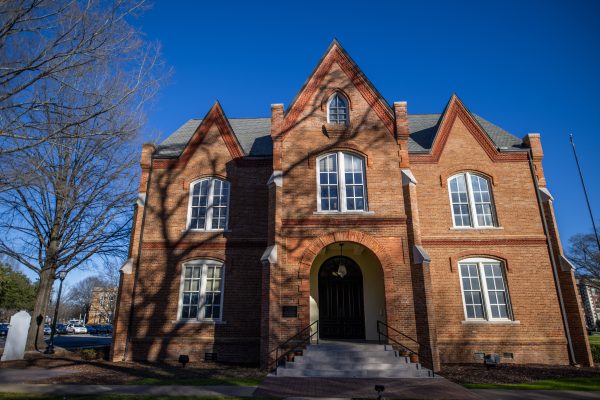SGA chief of staff asks senators to withdraw Lucy-Graves Hall opposition
February 9, 2022
Three Student Government Association senators drafted a resolution in opposition to the Lucy-Graves Hall renaming. Now, chief of staff Nathan Yamaguchi is discouraging them from presenting the legislation during the Feb. 10 Senate session.
The board of trustees voted to rename Bibb Graves Hall to Lucy-Graves Hall on Feb. 3, the 66th anniversary of Autherine Lucy Foster’s enrollment at the University. Lucy was the first Black student to attend the University but was suspended after riots and protests broke out on campus.
Lucy hid out in Graves Hall, named for former Alabama governor and Ku Klux Klan leader Bibb Graves.
Sens. John Dodd, Paige Hoss and Jordan Jones, co-authors of the resolution, called the board’s decision to include both Lucy’s and Graves’ names “tone-deaf,” “insensitive” and “disappointing.”
After widespread backlash following the renaming, the board announced it will revisit the decision on Friday, Feb. 11. Dodd said it’s important to propose this legislation before the board finalizes its decision.
Yamaguchi emailed Dodd on Monday to express his hesitancy toward the resolution, which said the SGA “overwhelmingly supports the removal of Bibb Graves’ name from Lucy-Graves Hall.” He said it would be in the best interest of the legislation to wait until after the board meeting on Friday.
“[The meeting] was exciting news to hear, because there’s been a lot of concerns, obviously, voiced by the student body,” Yamaguchi said. “And I simply suggested to the authors that it might be a good idea to hold off presenting it, simply because it would be in the best interest of the legislation if it was presented at a time when a decision had been made by the board.”
Yamaguchi said he finds Graves’ actions disturbing but recognizes the “struggle” the University is facing.
“As a Catholic man, it is disturbing to ponder realities such as one Governor Graves engaged with that existed not long ago — realities that could have entailed persecution of someone like myself,” he wrote. “But I do recognize the struggle in balancing the preservation of history and the maintenance of an environment that does not idolize what is inherently wrong.”
Dodd said he’s disappointed by the SGA executive leadership’s response.
“I am being strong-armed by SGA executive officials to withdraw legislation that’s endorsed by a majority of [National Pan-Hellenic Council] organizations only because we don’t want to hurt the board of trustees’ feelings,” Dodd said. “Who cares about the board’s feelings?”
Four NPHC organizations endorsed the legislation: Alpha Phi Alpha Fraternity Inc., Delta Sigma Theta Sorority Inc., Phi Beta Sigma Fraternity Inc. and Alpha Kappa Alpha Sorority Inc.
Yamaguchi said the resolution needs to include all aspects of Graves’ contributions to Alabama and asked the authors to remove the legislation from the Senate docket until the board announces its decision.
While in office, Graves increased education funding from $9.9 million to $25 million across the state, landing his name on multiple Alabama campuses. Salaries for Black teachers increased, but remained lower than white teachers overall.
Some schools, including Alabama State University and Troy University, have since removed his name from campus buildings.
“I think it needs to be clear that you find that the harmful works of this individual [Graves] outweighed the betterment of his works, as I don’t think there is any question that Governor Graves made tremendous strides for the good of the state of Alabama including creating unprecedented positive change for minorities and people of color,” Yamaguchi said. “I don’t believe this is an excuse for his involvement with the Ku Klux Klan, but to leave it out of the entire picture is a disservice to those scratching their heads regarding the decision to allow his name to remain.”
John England, Jr., chair of the group that proposed the renaming, defended the dual honoring of Lucy and Graves on account of Graves’ later renouncing of the Klan.
“Governor Graves started a political career in an association with the Klu Klux Klan but became governor and took monumental steps to resist the Klan, just as Autherine Lucy,” England said during the Feb. 3 board of trustees meeting.
Correction: This story was updated on Feb. 10 at 9:45 a.m. to clarify that England’s comment was made during a Feb. 3 board of trustees meeting.
Isabel Hope and Zach Johnson contributed to the reporting of this story.











